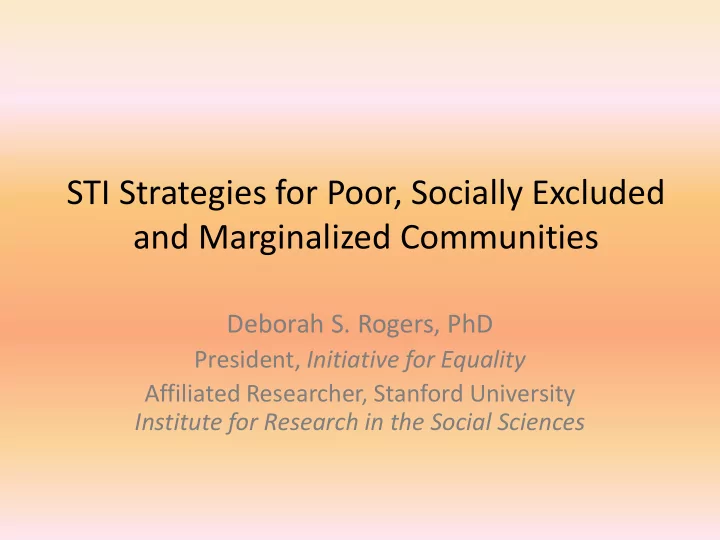

STI Strategies for Poor, Socially Excluded and Marginalized Communities Deborah S. Rogers, PhD President, Initiative for Equality Affiliated Researcher, Stanford University Institute for Research in the Social Sciences
The purpose of Science, Technology & Innovation is to serve people… • to serve poor, socially excluded and marginalized communities • to lead towards more equitable development
“Leave no one behind” means that everyone’s needs must be met • not that everyone has identical technology • not that everyone is brought into the same project of globalization
The key to working effectively on behalf of poor, socially excluded and marginalized communities • let people articulate their own needs • let people set their own development agenda
IfE’s Field Hearings take input from poor, socially excluded and marginalized communities • Initiative for Equality (IfE) is a global network of advocates for greater equality • our Field Hearings are conducted by local civil society partners, in local language • over 109 Field Hearings in 27 countries thus far • mainly in Africa and Asia; also Europe and North America; currently recruiting in Latin America • 34 earlier reports published in collection “Waiting To Be Heard ” • 75 new reports in progress
What do people tell us that they want?
1. They want to participate in developing the ideas and making the decisions! • Community members tell us that they have no influence over political and economic decisions
2. They want to be the ones to get the contracts for development projects. • Community members tell us that contracts for development go to those who are well-off, not to those in need of jobs
3. They want education. • Every community talked about this • They want it so their children will have a better future. • They also want it so that infrastructure and environmental problems are addressed based on best practices.
4. They want improvements to the public infrastructure. • Roads, drainage, lighting, sanitation SOIL, a non-profit in Haiti helps people to build and use composting toilets.
5. They want more and better communications. • Cell phones with strong signal • Internet; laptops or smartphones • Radio: call-in shows so they can express themselves as well as listen (e.g. Gram Vaani)
A note on IT for political participation: • Donors, academics and activists interested in promoting democracy decided that mobile phone apps could help: – instant polls – citizen monitoring of bad actions – feedback on policies & programs • Recent academic studies and feedback from activists in the field call this into question • There is no “app for democracy” – it takes on-the- ground organizing and vertically integrated advocacy
6. They want health problems addressed without expensive technology & medicine.
7. They want agricultural productivity problems solved without expensive technology. • Oil-based fertilizers too expensive • Pesticides and herbicides make farmers and their children sick • Patented seeds cannot be freely used by farmers
8. They want environmental problems solved without expensive technology. • Pollution from industry • Pollution from poor sanitation • Pollution from agricultural runoff • Pollution from inadequate methods of lighting and cooking
9. They are very aware of changing weather patterns, but don’t mention “climate change.” • Most farmers told us the weather is changing in detrimental ways. • They do not understand the magnitude of the problem. • They are all thinking about how to adapt. • Some are adapting well with no outside help. • The farmers need to be driving the decisions on adaptation, based on traditional knowledge and shared information with other farmers.
Floating farms in Bangladesh, as water levels rise.
10. They want to continue meeting, discussing, sharing ideas, and planning for the future.
Thank you! Initiative for Equality (IfE) Email: deborah.rogers@initiativeforequality.org website: www.initiativeforequality.org Facebook: https://www.facebook.com/InitiativeforEquality Skype: deborahsrogers Twitter: IfE_Deborah
Recommend
More recommend